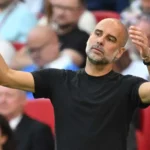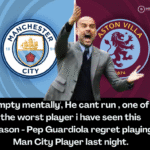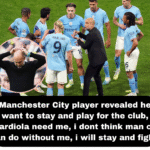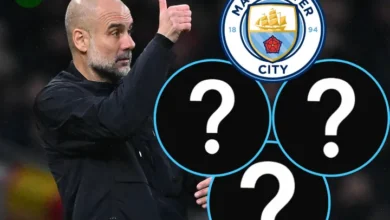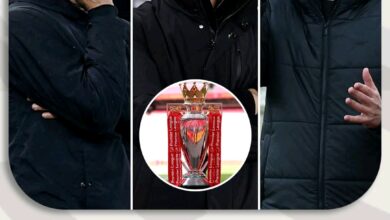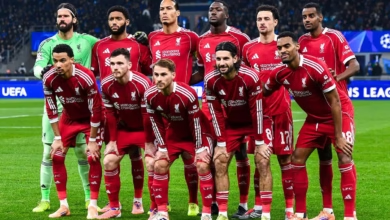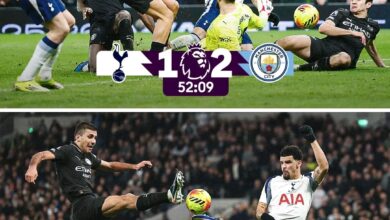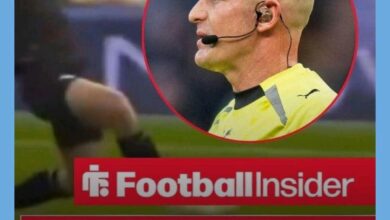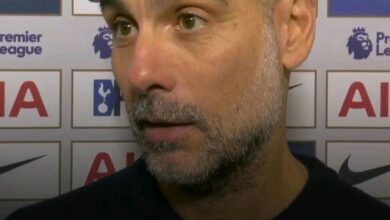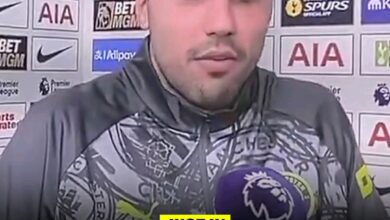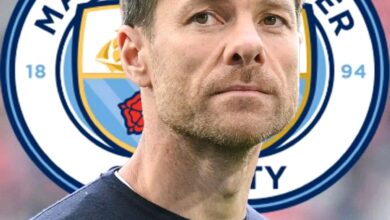Two Man City players fuming at Bernardo Silva proves Pep Guardiola point about Champions League advantage

On a crisp Friday evening at the Etihad Stadium, Manchester City edged closer to securing Champions League football with a hard-fought 1-0 victory over Wolverhampton Wanderers. In what was a match of fine margins, it was the brilliance of Kevin De Bruyne that ultimately made the difference, as the Belgian maestro’s precise first-half finish secured all three points for Pep Guardiola’s men.
The significance of this victory cannot be understated. After a tumultuous season that has seen City surrender their Premier League crown, the focus has now shifted entirely to regaining their place among Europe’s elite. With this win, City remain firmly entrenched in the top five, putting increased pressure on their rivals as the battle for Champions League qualification reaches its climax.
“We showed focus and determination,” Guardiola had written in his pre-match programme notes, and those words proved prophetic as his team displayed the discipline and personality required to overcome a resolute Wolves side that twice struck the woodwork but ultimately left empty-handed.
De Bruyne’s Farewell Tour Continues
For Kevin De Bruyne, the evening held special significance. With his impending departure from the club looming large, each remaining home appearance takes on an additional layer of poignancy. His performance against Wolves epitomized everything that has made him such a beloved figure at the Etihad—technical brilliance combined with an unrelenting work ethic that has been the hallmark of his illustrious City career.
The goal itself was vintage De Bruyne—a precise, side-footed finish from a Jeremy Doku cutback that left José Sá with no chance. The execution was clinical, the movement intelligent, and the celebration heartfelt as the Etihad faithful rose to serenade a player who has given them so many magical moments over the years.
But it wasn’t just his goal that impressed. Throughout the match, De Bruyne showcased the full range of his abilities. There was a moment in the first half when he tracked back to bulldoze a Wolves midfielder, halting a dangerous counter-attack. Shortly after, he dispossessed another opponent from behind to win a throw-in—actions that drew cheers from the crowd that matched the volume reserved for goals.
When his number was raised with seven minutes remaining, the stadium erupted once more, providing De Bruyne with a standing ovation that underscored his importance to the club over the past nine years. While he seemed somewhat reluctant to bask in the adulation, there was a noticeable change in his demeanor compared to previous substitutions. He walked a little slower, acknowledging the fans who have followed him through triumph and adversity.
At full-time, the stadium PA system blasted Seven Nation Army, prompting another rendition of De Bruyne’s chant as he completed a lap of honor. The emotional connection between player and supporters was palpable, with both parties acutely aware that their time together is drawing to a close. The next time he steps onto this hallowed turf will be his final appearance as a Manchester City player—a thought that seemed to weigh heavily on everyone present.
Haaland’s Return: A Boost for the Run-In
While De Bruyne’s performance captured the headlines, the return of Erling Haaland to the matchday squad represented another significant boost for City. After a month on the sidelines, the Norwegian striker’s inclusion provided a psychological lift, even though he ultimately remained an unused substitute.
Haaland’s pre-match routine provided some insight into his current status. His participation in the warm-up was minimal—just two chipped attempts towards the crossbar before retreating to the periphery. For the most part, he either remained in the dressing room or engaged in conversation with fellow Norwegian Jorgen Strand Larsen, who was not in the Wolves squad.
When Omar Marmoush went down injured in the second half, it was James McAtee who was instructed to warm up, suggesting that Guardiola was reluctant to risk his star striker unnecessarily. Haaland did eventually emerge to applause, embracing former Salzburg teammate Hwang Hee-chan, but his involvement remained limited to these brief interactions.
The decision to keep Haaland in reserve was undoubtedly influenced by the fixture schedule. With eight days until the trip to Southampton, Guardiola opted for caution, preserving his talismanic forward for the challenges ahead. The fact that Haaland was deemed fit enough for the bench, however, indicates that his return to action is imminent—a prospect that will strike fear into the hearts of opposition defenders.
Team Standards: The Moments of Tension
What makes Manchester City’s success so remarkable is the relentlessly high standards that permeate every aspect of the club. This was evident in several moments during the match where players and staff demanded more from each other, even when leading.
Early in the contest, Bernardo Silva and De Bruyne found themselves standing over a promising free-kick on the right flank. Logic dictated that De Bruyne, with his peerless right foot, would be the ideal candidate to deliver the ball. Bernardo, however, took charge and promptly hit his cross into the first man. Although Omar Marmoush managed to flick the ball towards goal, it was a comfortable save for José Sá.
The reaction from Rúben Dias was immediate. The Portuguese defender had positioned himself for a header and made his frustration clear as he returned to his defensive position. De Bruyne, too, had words for his teammate, who appeared to have no response to the criticism. On the touchline, Guardiola turned away in evident frustration at the wasted opportunity.
The manager’s dissatisfaction wasn’t limited to that incident. When Ederson chipped a ball out of play towards the end of the match, gifting Wolves momentum at a crucial juncture, Guardiola’s exasperation was visible. These moments underline the perfectionism that has defined City’s approach under his stewardship—an unwillingness to accept complacency, regardless of the scoreline or context.
Yet there was also recognition when those standards were met. In the dying stages, Joško Gvardiol produced a crucial piece of defending to win a free-kick, alleviating pressure and allowing City to maintain control. This intervention was met with on-pitch applause from Bernardo, Dias, and Mateo Kovačić, as well as from Guardiola himself. It was a telling moment—an acknowledgement of the collective commitment required to achieve success at the highest level.
The Champions League Quest
The result against Wolves represents another significant step in City’s quest to return to the Champions League. After a challenging campaign that has seen them fall short in their pursuit of the Premier League title, securing a place in Europe’s premier club competition has become the primary objective.
Guardiola’s comments in his programme notes suggested a growing confidence in his squad’s ability to achieve this goal. “I can feel the players are ready for the Champions League fight,” he wrote, emphasizing the focus and determination they are displaying as the season reaches its conclusion.
The win over Wolves maintained City’s position in the top five, with every point now crucial in the battle for European qualification. The trip to Southampton next weekend presents an opportunity to further consolidate their standing, before attention turns to the FA Cup final against Manchester United.
For a club that has become accustomed to competing at the very pinnacle of European football, the prospect of missing out on the Champions League would be unthinkable. The performance against Wolves, while not spectacular, demonstrated the resilience and professionalism that will be essential in securing their place among the continent’s elite next season.
Guardiola’s Influence: The Neil Warnock Connection
In an intriguing subplot to the match, it emerged that Neil Warnock had recently visited City’s training ground. The veteran manager, known for his no-nonsense approach and remarkable success in the lower divisions, might seem an unlikely figure to influence Guardiola’s philosophy. Yet the Catalan’s call for “discipline but also personality” echoed themes that Warnock has espoused throughout his career.
The disciplined yet expressive manner in which City saw out the victory against Wolves would have pleased both managers. There was a controlled aggression to their play, a willingness to do the unglamorous work when required, while still maintaining the technical excellence that has become their hallmark.
This balance between discipline and personality has been a recurring theme in City’s most successful periods under Guardiola. It’s a reminder that for all the tactical innovation and technical brilliance, there remains a fundamental appreciation for the traditional values of hard work, commitment, and mental strength.
As the team navigated the challenging fi


